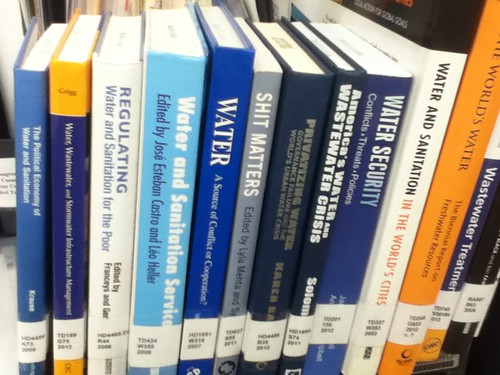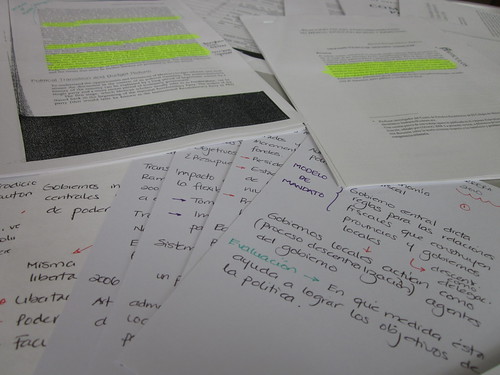One of the challenges I face as a multidisciplinary researcher who doesn’t accept the traditional, discipline-based boundaries rigidly set by traditional academic standards is to find the right balance of focus and diversification (and the right balance of writing what you want to write right now versus what you need to finish). For many years, I taught at a political science department. My research was targeted to political science audiences. I was, for all purposes, a political scientist with a specialization in comparative environmental politics and policy. Even with an interdisciplinary training (chemical engineering, business administration, economics of technical change, human geography, planning and political science), I had to target those audiences.
There’s a number of tensions that we academics need to grapple with. First, we want to publish in highly-ranked, reputable journals with (hopefully) high impact. Since the lingua franca of research worldwide is still English, we need to target journals in the higher tiers of their own disciplines (Global Environmental Politics, for example, in my own area of research). But then you also have another tension: you want to publish widely-read scholarship, so you need to decide if you publish in an open-access journal, regardless of the rank. Moreover, you want to broaden your audience. In my case, I teach in a Spanish-speaking country, but I have lived and taught in English for the majority of my professional life. So, I find myself grappling with whether to publish in Spanish or in English-language journals.
Then you have the subject-area tension. I’m widely known as a scholar of sanitation and wastewater governance. For the past decade, I have studied cooperative approaches to resource governance using the wastewater sector as a case study. But I also have done other research: I have studied transnational environmental social movements’ mobilization strategies. My doctoral dissertation created a multidisciplinary framework to explore regional innovation dynamics in industrial clusters. Thus, I have also written about human geography and industrial restructuring. I have done policy evaluation projects ranging from climate change to water and toxics. And lately I’m interested in poverty from a water and energy perspective. And recently, I’ve moved back to studying solid waste governance. So, I have multiple scholarly interests, and competing forces pulling me in different directions. What am I supposed to do? Just do sanitation and forget about all the other interesting research projects that come my way? Block my own intellectual curiosity and focus solely on just one field? Do I just want to publish ONE solid piece in a highly-respected journal every few years, or do I focus on a variety of projects, so as to make my scholarly avenues broader?
Furthermore, given the ridiculously long time-to-publish queues in some fields (particularly political science), if I want to have a nice journal article published in 2-3 years, I need to submit it right about now. Peer-review practice is one I am extremely critical of. I am an Associate Editor of a journal, I am on the editorial board of 5 journals, and I always aim for 2 weeks to a month for my own peer reviews. But not everybody is as fast as I am. I review at the very least a journal manuscript a week (and some people seem to be overwhelmed when journal editors ask them for a review a year!)
Thus, I have found myself working within a framework where I attempt to balance focus and diversification. I don’t stray away from my core intellectual strengths nor from my experience. I don’t do conservation. I don’t do forests. I have barely scrapped the literature on climate policy with my own work (although I’m moving towards climate policy evaluation and water governance under extreme climatic events), I stay away from scholarly undertakings far from my own field (although who wouldn’t want to study the Internet, for example?).
At the same time, I never write just one piece. Every single day of the week (7 days a week), I write for two hours, and I write on a variety of topics. I am working on getting stuff out that I worked on for a long while and that should have been published a long time ago. But I am also giving myself the opportunity to “test-drive” new ideas. For example, for a long time I stayed away from the water privatization literature. I only dealt with it insofar sanitation infrastructure is a municipal-level undertaking, and sometimes local governments seek to privatize wastewater treatment and sewerage provision. However, in finishing a recent book chapter on sanitation, I came across really interesting data and concepts on bottled water. Thus, I am currently working on a paper on the political aspects of bottled water. Not my main research focus by and large, but a really interesting (and under-explored) field. I don’t work on the bottled water stuff for long, because I have other research commitments (e.g. coauthored pieces). But I am mildly obsessed with the literature on the privatization of water supply and the provision and consumption of bottled water. While this is happening, I am taming my obsession by staying true and focused to what I need to get out in 2013, but thinking towards 2014 and 2015 on what kind of work I will be doing.
Having multiple projects on the go also allows me to have a higher per-year productivity. Since different journals will have varying publishing schedules, I can work on, write and submit several pieces and wait until I get a rejection or revise-and-resubmit (or, hopefully, until they get accepted!). By writing sections of several papers at the same time, I am able to keep myself busy without overwhelming myself with an “OMG I have not finished this paper due this week and I’m frozen with writers’ block“. There are topics that come to me much more easily (sanitation and anything to do with neoinstitutional theory), and topics that push my intellectual boundaries (water conflict, experimental methods work, or highly-sophisticated quantitative stuff, or heavy formal modeling, or social constructivism).
Moreover, having multiple projects on the go enables me to find where my research trajectory is moving. If I see that a topic is being over-researched (I have a love-hate with climate politics, for example), I can move my work in a different direction. I am well aware that intractable water conflict is challenging me intellectually. I know very little about water privatization (which is a really big field). The anthropology of public policy is another topic that is calling my name. So, I am balancing focus with some degree of diversification. I focus when I need to finish a manuscript, but I always have multiple writings on the go.
And of course, there is also the challenge of finding the right balance of teaching versus research, and service to the university, to the community and to my discipline and peers. Academia is a profession that, like many others, requires balance. I am trying every day to attain a balance of healthy living, solid research and teaching. Not an easy challenge, but not impossible either.




One Response
Stay in touch with the conversation, subscribe to the RSS feed for comments on this post.
Continuing the Discussion